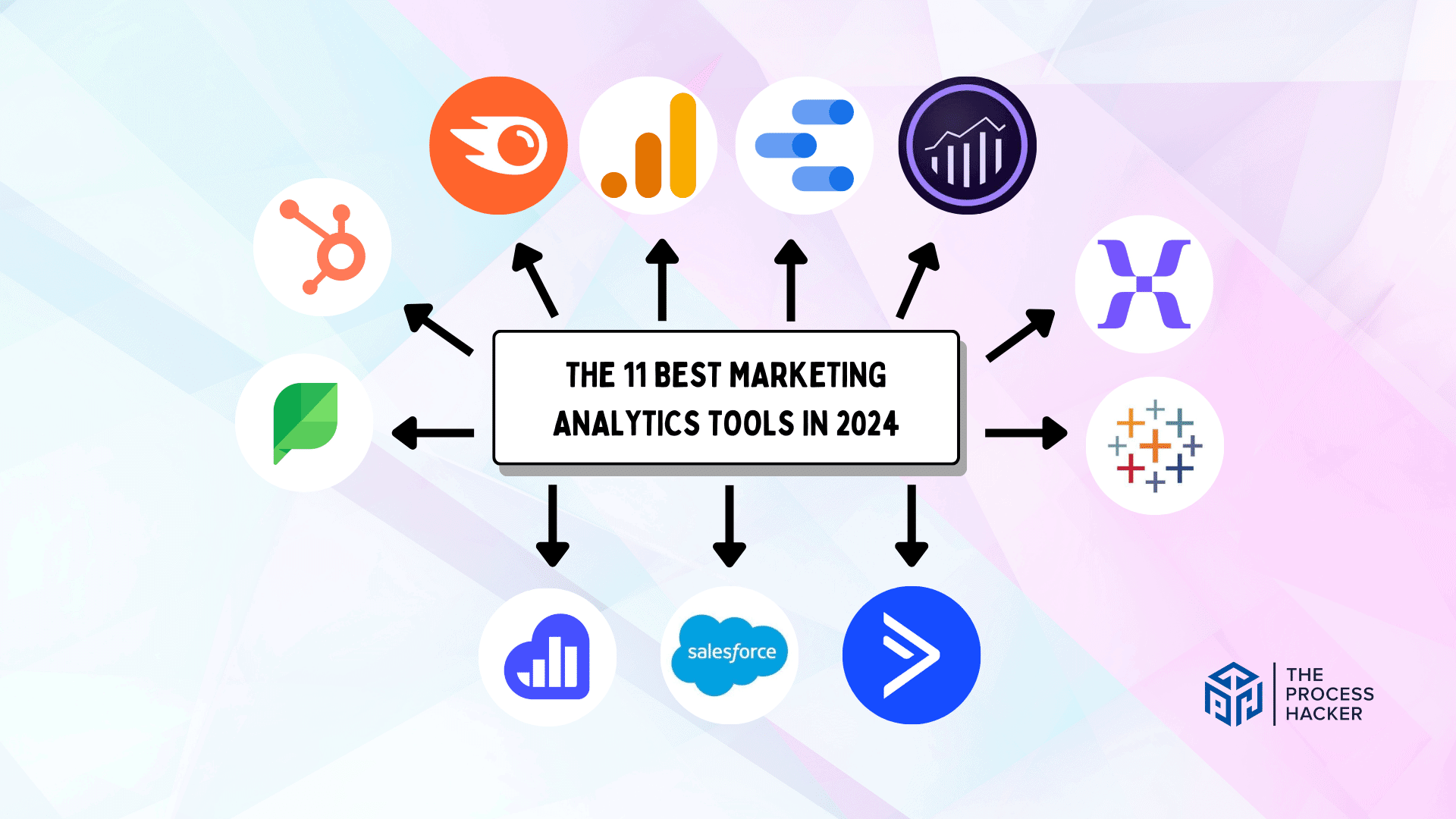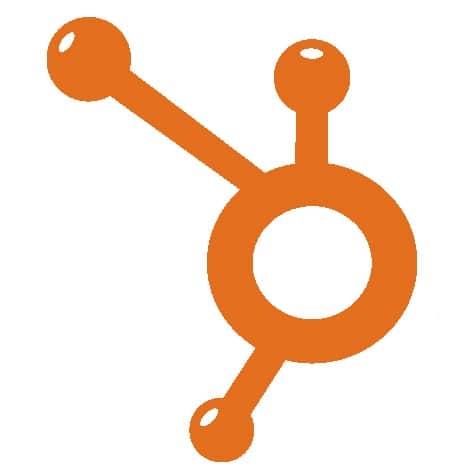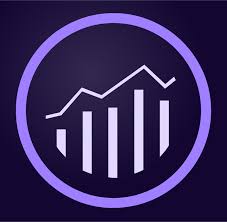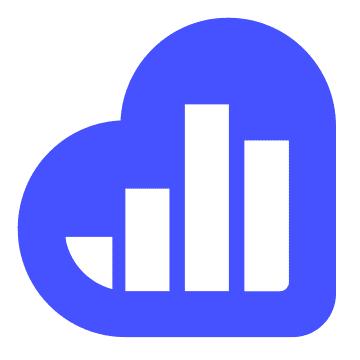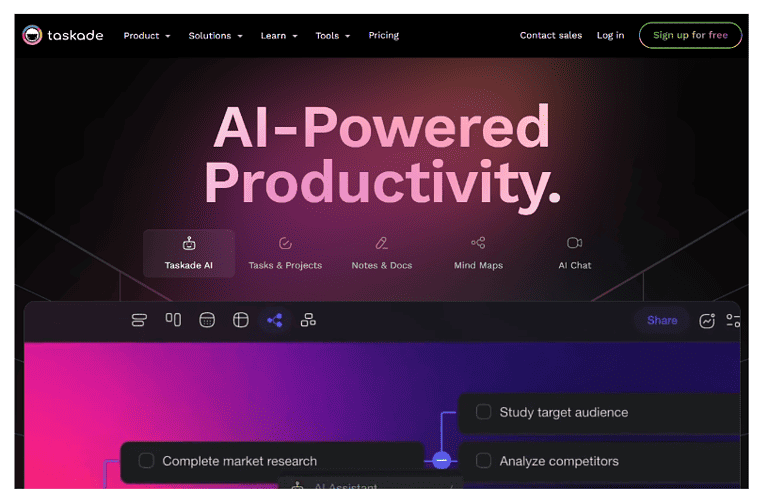The 11 Best Marketing Analytics Tools In 2024
In today’s digital world, data is key. To stay competitive and grow your business, you must have a solid understanding of your marketing efforts.
That’s where marketing analytics tools come in. These powerful tools provide valuable insights into customer behavior, campaign performance, and overall ROI.
If you purchase through our partner links, we get paid for the referral at no additional cost to you! For more information, visit my disclosure page.
With new technologies emerging constantly, the marketing analytics landscape is rapidly changing. So, what are the best tools for businesses and marketing agencies?
In this blog post, we’ve curated a list of the top marketing analytics tools you need to know about to maximize your success in the coming year and beyond.
What Are The Best Marketing Analytics Software Tools?
Let’s explore the leading marketing analytics tools and how they can empower your business strategies.
- HubSpot – Best Overall Sales & Marketing Analytics Software
- Semrush – Best for Comprehensive SEO Analytics Tools
- Google Analytics – Best Marketing Analytics Software for Website Traffic
- Google Data Studio – Best for Creating Customizable Dashboards & Reports
- Adobe Analytics – Best for Tracking the Customer Journey
- Mixpanel – Best for Tracking User Behavior on Web and Mobile Apps
- Tableau – Best Marketing Analytics Tool for Data Visualization
- ActiveCampaign – Best Email Marketing Analytics Tools
- Salesforce Marketing Cloud – Best Tool for Marketing Data Automation & AI
- Kissmetrics – Best Marketing Analytics Tool for E-commerce & SaaS Analytics
- Sprout Social – Best Marketing Analytics Tool for Social Media Analytics
1. HubSpot – Best Overall Sales & Marketing Analytics Software
Overview
HubSpot offers a robust analytics suite that empowers you to turn data into actionable insights. Analyze website traffic, sales performance, and campaign effectiveness clearly and easily.
This integrated platform centralizes your marketing and sales efforts, making it ideal for organizations seeking a unified approach to achieving growth.
Key Benefits
- Unified Dashboard: Access all your marketing analytics in one place for a comprehensive overview.
- Detailed Reporting: Dive deep into your data with customizable reports on sales performance, website traffic, and more.
- Automation Tools: Streamline your marketing efforts with powerful automation that saves time and increases efficiency.
- SEO and Content Strategy Tools: Use built-in SEO tools to optimize your content for search engines and plan your content strategy.
- Lead Management: Track and nurture your leads effectively from their first interaction to the sale.
Pricing
HubSpot provides a free plan with a range of basic tools to familiarize yourself with the platform. Paid plans begin with the Starter package of $15 per seat per month, offering expanded capabilities at a cost-effective starting point.
Pros
Cons
2. Semrush – Best for Comprehensive SEO Analytics Tools
Overview
Overview
Semrush is a must-have toolkit for businesses seeking to dominate search engine rankings and drive organic traffic growth. This SEO automation tool provides in-depth insights into your website’s health, competitive landscape, and keyword performance, enabling data-backed strategies to boost your digital visibility.
Key Benefits
- Robust SEO analysis: Identify high-potential keywords and optimize your website for search engines.
- Competitor intelligence: Analyze competitor tactics, identify gaps, and gain a strategic edge.
- Content optimization tools: Create content aligned with search intent and user preferences.
- Backlink tracking: Analyze your backlink profile and discover new link-building opportunities.
- SEO metrics: Measure your website’s ranking, backlinks, and growth over time.
Pricing
Pricing for Semrush starts at $129.95 per month for the Pro plan, which is designed for freelancers who accept outsourced SEO projects, startups, and in-house marketers with limited budgets but needing powerful SEO tools.
Pros
Cons
3. Google Analytics – Best Marketing Analytics Software for Website Traffic
Overview
Google Analytics is a powerful and widely used web analytics service. It offers a comprehensive suite of tools to track and analyze website traffic, providing valuable insights into audience behavior, campaign performance, and conversion patterns.
If you want to optimize your website and marketing for results, consider Google Analytics essential.
Key Benefits
- Detailed Traffic Analysis: Gain granular insights into visitor sources, content engagement, and navigation patterns.
- Goal & Conversion Tracking: Set up and monitor conversions vital to your business, whether form submissions, purchases, or other key actions.
- Robust Audience Segmentation: Delve deeper into visitor demographics, interests, and behaviors for targeted marketing efforts.
- Google Ecosystem Integration: Leverage your data effectively with seamless integration into Google Ads and other marketing tools within the Google suite.
Pricing
Google Analytics provides a robust free version suitable for most businesses. The paid enterprise-level version, Google Analytics 360, offers additional capabilities and support for organizations with high-volume needs.
Pros
Cons
4. Google Data Studio – Best for Creating Customizable Dashboards & Reports
Overview
Google Data Studio offers a flexible platform to transform raw marketing data into visually appealing, easy-to-understand reports. Visualize key business metrics, track trends, and effortlessly share insights across your team.
Google Data Studio is a powerful choice if you need tailored reporting on the fly.
Key Benefits
- Intuitive drag-and-drop interface: Build custom dashboards tailored to your needs without complex coding.
- Diverse data source integration: Connect with Google Analytics, Google Sheets, BigQuery, and hundreds of other external sources.
- Collaborative reporting: Share insights, get feedback, and iterate on your dashboards with your team.
- Visually striking reports: Design impactful reports that highlight the most important metrics.
Pricing
Google Data Studio is available at no cost, making its powerful reporting and data visualization tools accessible to everyone. There are no paid plans, as it is fully integrated with Google’s suite of free and enterprise tools, ensuring comprehensive analytics capabilities without additional expense.
Pros
Cons
5. Adobe Analytics – Best for Tracking the Customer Journey
Overview
Adobe Analytics is a powerful enterprise-level solution for businesses seeking to deeply understand their customers’ journeys across multiple touchpoints. It enables tracking across website behavior, app usage patterns, and offline data, providing a complete picture of customer interactions.
Key Benefits
- Comprehensive customer journey analysis: Map the entire customer experience, identifying engagement points and areas for improvement.
- Advanced segmentation: Create particular customer segments based on behavior, demographics, and other relevant data.
- AI-powered insights: Discover trends, anomalies, and opportunities that might be missed with a purely manual approach.
- Sophisticated attribution modeling: Accurately measure the impact of different marketing channels on conversion goals.
Pricing
Adobe Analytics offers custom pricing based on your business’s specific needs and scale. Interested parties should contact Adobe directly for a quote tailored to their requirements.
Pros
Cons
6. Mixpanel – Best for Tracking User Behavior on Web and Mobile Apps
Overview
Mixpanel offers a powerful analytics platform that provides granular insights into how individuals use your website and mobile applications. It excels at event tracking, allowing you to analyze specific user actions, conversion paths, and engagement patterns.
If optimizing your app or website experience is a priority, Mixpanel provides the data needed for informed decision-making.
Key Benefits
- Detailed event tracking: Monitor specific actions (e.g., button clicks, form submissions) to understand in-depth user behavior.
- Robust user segmentation: Create targeted audience groups based on their behavior patterns for personalized marketing.
- Insightful funnel analysis: Visualize user journeys, identify bottlenecks, and optimize conversion flows.
- A/B testing integration: Experiment with features and designs to improve app or website performance.
Pricing
Mixpanel’s pricing starts at $24 per month for the Growth plan. This plan offers access to core analytics tools with data history and volume limits suitable for small—to mid-sized businesses looking to scale their insights.
Pros
Cons
7. Tableau – Best Marketing Analytics Tool for Data Visualization
Overview
From the well-known Salesforce, Tableau is a highly regarded leader in data visualization. It empowers organizations to transform raw marketing data into visually compelling charts, graphs, and interactive dashboards.
With Tableau, you can readily analyze complex data, identifying trends and patterns that drive strategic business decisions.
Key Benefits
- Intuitive drag-and-drop interface: Seamlessly build dynamic visualizations without extensive coding expertise.
- Wide-ranging data connectors: Integrate effortlessly with a diverse array of data sources.
- Interactive dashboards: Create dashboards with drill-down features to enable in-depth exploration.
- Collaboration & sharing: Easily share insights and reports with colleagues for informed decision-making.
Pricing
Tableau offers tiered pricing plans starting from $15 per user per month to address the needs of individuals and larger organizations. Individual plans begin with Tableau Creator, providing comprehensive visualization tools.
Pros
Cons
8. ActiveCampaign – Best Email Marketing Analytics Tools
Overview
ActiveCampaign excels as an all-in-one marketing automation platform with advanced email marketing capabilities. It offers in-depth analytics to track the success of your email campaigns, uncovering insights to enhance your marketing efforts over time.
Beyond email, ActiveCampaign provides tools for SMS marketing, site messaging, and CRM functionality for a well-rounded approach.
Key Benefits
- Detailed email analytics: Understand open rates, click-through rates, conversions, and more.
- A/B testing tools: Experiment with email subject lines, content, and design for maximum impact.
- Automated email sequences: Nurture subscribers with targeted messaging based on their behavior.
- CRM integration: Create a centralized view of customer interactions across marketing and sales.
- Personalized Messaging: Deliver customized emails and messages at scale.
Pricing
ActiveCampaign offers a range of plans starting from $39 billed monthly with flexible pricing to suit businesses of all sizes. The entry-level ‘Lite’ plan provides core email marketing and automation tools.
Pros
Cons
ActiveCampaign provides an exceptional suite of tools for email marketing KPI analytics and automation. It’s an excellent choice for businesses looking to enhance their email marketing efforts with detailed insights and targeted strategies.
9. Salesforce Marketing Cloud – Best Tool for Marketing
Overview
Salesforce Marketing Cloud is a powerful suite of marketing automation tools designed for enterprises. It provides extensive capabilities for omnichannel campaign management, audience segmentation, personalization, and in-depth analytics.
If your organization requires a scalable solution with seamless integration into the Salesforce CRM, Marketing Cloud is an excellent choice.
Key Benefits
- Omnichannel campaign execution: Orchestrate marketing efforts across email, social media, mobile, and web channels.
- Sophisticated customer journey builder: Design highly tailored journeys with data-driven decision points.
- AI-powered personalization: Deliver the right message to the right audience at the right time.
- Robust analytics suite: Measure campaign performance, optimize results, and gain actionable insights.
Pricing
Salesforce Marketing Cloud offers customized pricing based on the specific tools and features you need. The first paid plan typically starts at $25 per user per month at a premium level. Exact pricing details are tailored to your business’s scale and requirements, ensuring you get the most value from your investment.
Pros
Cons
10. Kissmetrics – Best Marketing Analytics Tool for E-commerce & SaaS Analytics
Overview
Kissmetrics is designed to empower e-commerce and SaaS businesses by laser-focusing on customer behavior. It tracks visitor interactions and purchase patterns across your website or product, enabling in-depth customer journey analysis.
If growth for your online store or SaaS product is a top priority, Kissmetrics offers the insights to make it happen.
Key Benefits
- Focus on customer lifecycle: Understand actions that lead to conversions, increase customer retention, and maximize lifetime value.
- Cohort analysis: Analyze the behavior of similar customer groups over time, identifying patterns for targeted marketing.
- A/B testing & optimization: Measure the impact of website or product changes with data-driven insights.
- Revenue attribution: Track which marketing channels impact revenue growth most.
Pricing
Kissmetrics offers tailored plans to meet varying business needs. Their Silver plan provides a solid starting point of $199 for core analytics capabilities.
Pros
Cons
11. Sprout Social – Best Marketing Analytics Tool for Social Media Analytics
Overview
Sprout Social is a leading social media management platform with robust analytics capabilities. It provides a centralized hub for tracking performance across various social networks, measuring audience engagement, analyzing campaign impact, and benchmarking against competitors.
For organizations seeking to streamline social media management and gain actionable insights, Sprout Social offers a compelling solution.
Key Benefits
- Consolidated social media management: Streamline all social interactions and improve response times through a unified inbox.
- In-depth social analytics: Monitor key performance indicators (KPIs) such as reach, engagement, and sentiment across multiple platforms.
- Customizable reports: Tailor reports to focus on the metrics that drive your business goals.
- Competitive benchmarking: Evaluate performance in the context of your industry and identify areas for strategic improvement, especially for small businesses leveraging social media for marketing
- Integrated content publishing: Plan and schedule social media posts efficiently within the platform.
Pricing
Sprout Social offers scalable pricing plans starting at $249 per seat per month to suit the needs of businesses of all sizes. Their Standard plan provides a comprehensive suite of social management and web analytics tools, making it a suitable starting point for many organizations.
Pros
Cons
What Are Marketing Analytics Tools?
Marketing analytics platform collects, processes, and analyzes data from various marketing channels. It transforms raw data into actionable insights, revealing patterns, trends, and customer behavior.
These tools provide a data-driven approach to measuring the effectiveness of marketing campaigns, identifying areas for optimization, and making informed decisions about resource allocation.
By using marketing analytics tools, businesses gain a clear understanding of their target audience, the impact of their marketing efforts, and opportunities to enhance their strategies for greater overall success.
How Can Marketing Analytics Tools Benefit You?
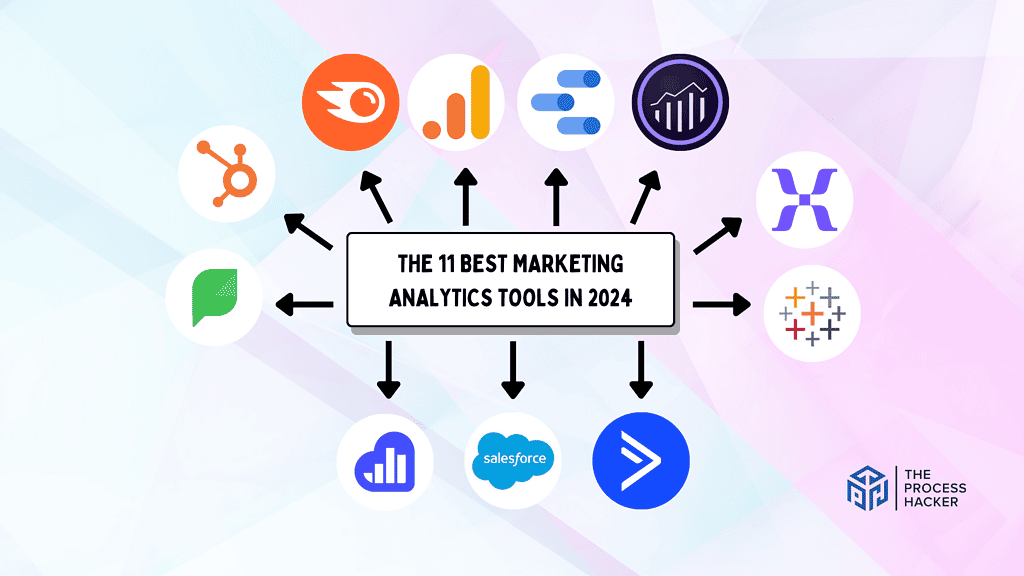
Marketing analytics tools transform the way you approach marketing. They offer a range of powerful benefits, including:
- Data-driven decision-making: Move beyond guesswork and make informed decisions based on real insights about your audience and marketing efforts. These tools provide the evidence to optimize campaigns, boost ROI, and allocate your budget more effectively.
- Improved audience understanding: Analytics tools unveil your customers’ preferences, behaviors, and pain points. This allows you to create highly targeted campaigns that resonate and drive conversions.
- Greater efficiency: With a wealth of data, you can identify high-performing channels, spot bottlenecks, and streamline your marketing processes. This translates into saving both time and money.
Let’s face it: marketing success hinges on understanding and adapting. Marketing analytics tools equip you with the knowledge and insights to excel in an ever-changing landscape.
What Features Should You Look For In Marketing Analytics Tools?
Here’s a breakdown of key features to consider when selecting a marketing web analytics tool:
- Data Integration: Look for a tool that seamlessly integrates with the various marketing platforms and data sources you use (e.g., social media, website analytics, email marketing software, CRM). This ensures a comprehensive view of your marketing efforts.
- Robust Reporting & Visualization: Choose a platform with flexible reporting options and clear, visually appealing dashboards. This will make it easy to identify insights, track key metrics, and share findings with your team.
- Customization: The ability to customize reports and dashboards is essential. This allows you to focus on the metrics that matter most to your business goals and objectives.
- Ease of Use: Especially critical for smaller marketing teams, consider a platform with a user-friendly interface. This allows you to quickly access and interpret data without advanced technical expertise.
- Scalability: Choose a tool that can grow alongside your business. Consider your future needs and ensure the platform can expand to accommodate additional data sources or increased analytical requirements.
Buyers Guide: How We Conducted Our Research
To ensure I provided the most valuable and up-to-date recommendations, I followed a rigorous research process:
- Market Analysis: I identified the top marketing analytics tools and software, considering industry reputation, feature breadth, and target audience.
- Hands-On Exploration: Wherever possible, I tested the tools ourselves, focusing on ease of use, data visualization capabilities, and integration potential.
- Expert Reviews & Customer Feedback: I carefully examined independent reviews, case studies, and user testimonials to gain a well-rounded understanding of real-world experiences.
- Key Factors: In my assessment, I prioritized the following:
- Features: Depth of functionality, range of analytics capabilities, and customization options.
- Pricing: Evaluating various pricing tiers and their suitability for businesses of different sizes and complexity.
- Ease of Use: Prioritizing intuitive interfaces and minimal technical knowledge requirements.
- Support & Community: Availability of help documentation, tutorials, customer service, and active user communities for ongoing assistance.
My goal was to provide a thorough and unbiased evaluation of the leading marketing analytics tools, empowering you to make a confident, informed decision for your business.
Final Thoughts on Marketing Analytics Tools
In conclusion, we have explored the top options available in the market and delved deep into the world of digital marketing analytics tools.
We have learned that with the ever-growing importance of data-driven decision-making, it is crucial to have the right tool at your disposal. From Google Analytics to HubSpot to Crazy Egg, each one offers unique features and advantages.
But ultimately, it all comes down to choosing the tool that fits your specific needs and goals. So why wait?
Take action now and try out the right marketing analytics tool for you today! Don’t let your competitors get ahead while you’re still struggling with manual data analysis.
Embrace technology and see your business reach new heights. As they say, knowledge is power, and with these powerful tools, you’ll have all the insights you need to make informed decisions and drive success for your business.
So go ahead, choose your tool, and start harnessing the power of data!
Frequently Asked Questions (FAQs)
What exactly is a marketing analytics tool?
Marketing analytics tools are software designed to collect, analyze, and visualize data from all your marketing campaigns and channels (e.g., website, email, social media). They help you understand customer behavior and measure the effectiveness of your marketing efforts.
Why do I need a marketing analytics tool?
Marketing analytics tools save you time and provide the clarity essential for successful, data-driven marketing. They enable you to make informed decisions rather than rely on guesswork, ultimately improving your return on investment (ROI).
How are marketing analytics tools different from regular website analytics?
While website analytics focuses solely on your website traffic and visitor behavior, marketing analytics tools offer a holistic view. They capture data from multiple sources, helping you understand the entire customer journey and how different marketing touchpoints contribute to your goals.
How do I interpret all the data from my marketing analytics tool?
Start by focusing on the metrics (KPIs) that align with your overarching business objectives. For example, if lead generation is a priority, track website conversions, content downloads, and form submissions.
Do I need technical expertise to use marketing analytics tools?
Many tools are designed with user-friendliness in mind. However, a basic understanding of marketing metrics and terminology is helpful. Utilize any available tutorials or support resources.
Can marketing analytics help with my SEO efforts?
Absolutely! Analytics platforms can help you analyze keyword performance, identify content optimization opportunities, and track your website’s search engine visibility over time.

